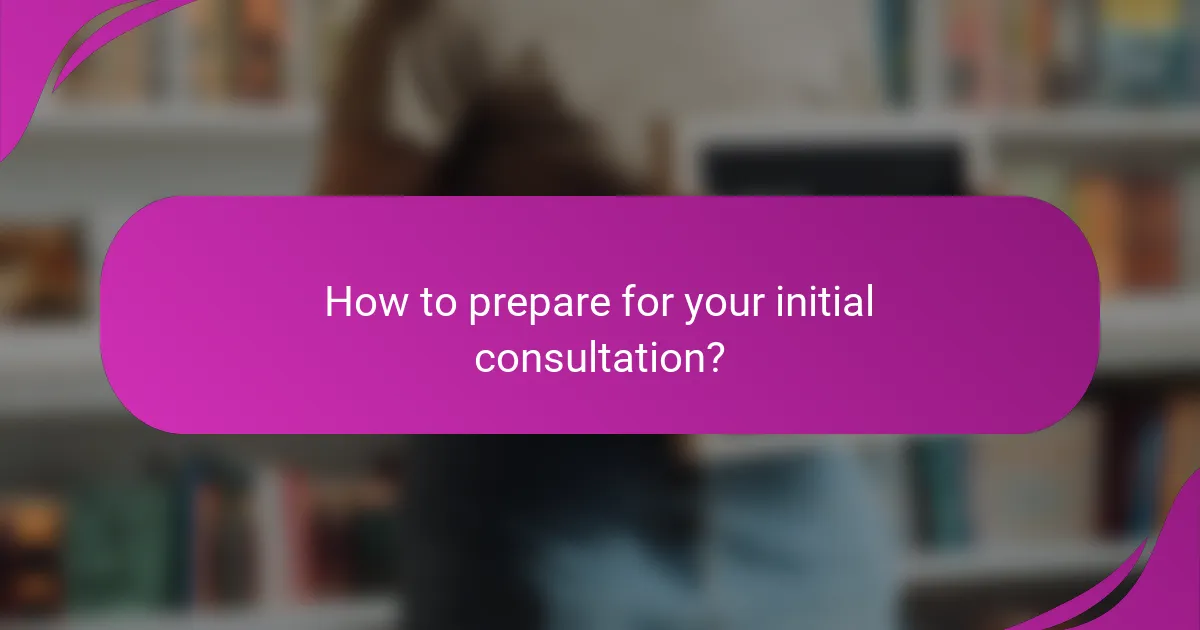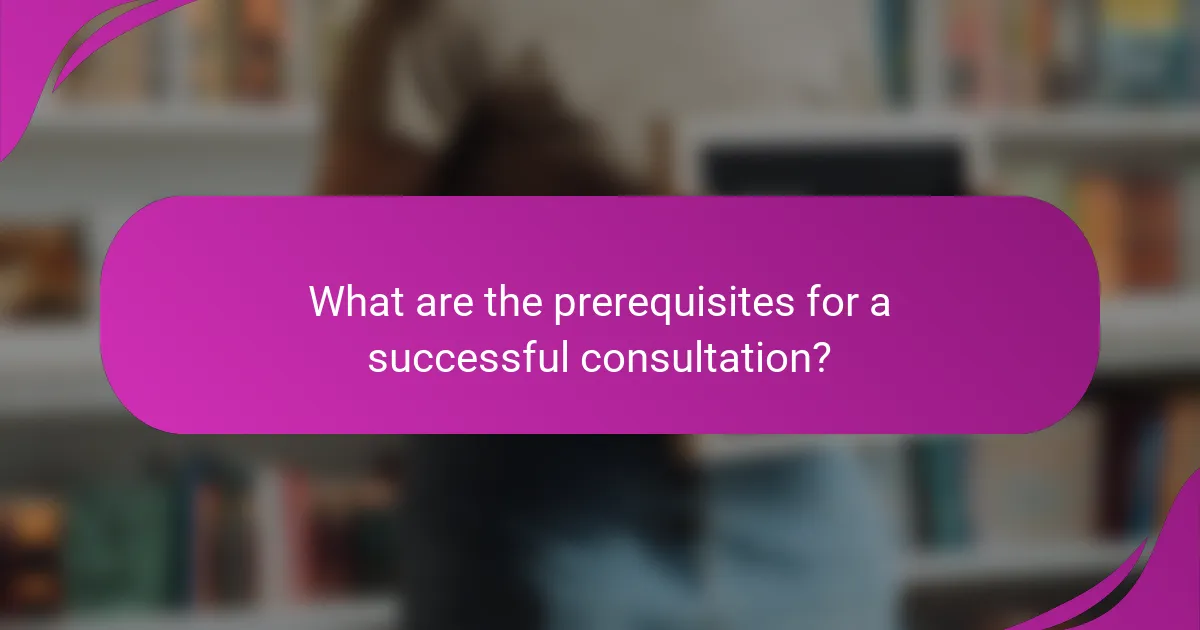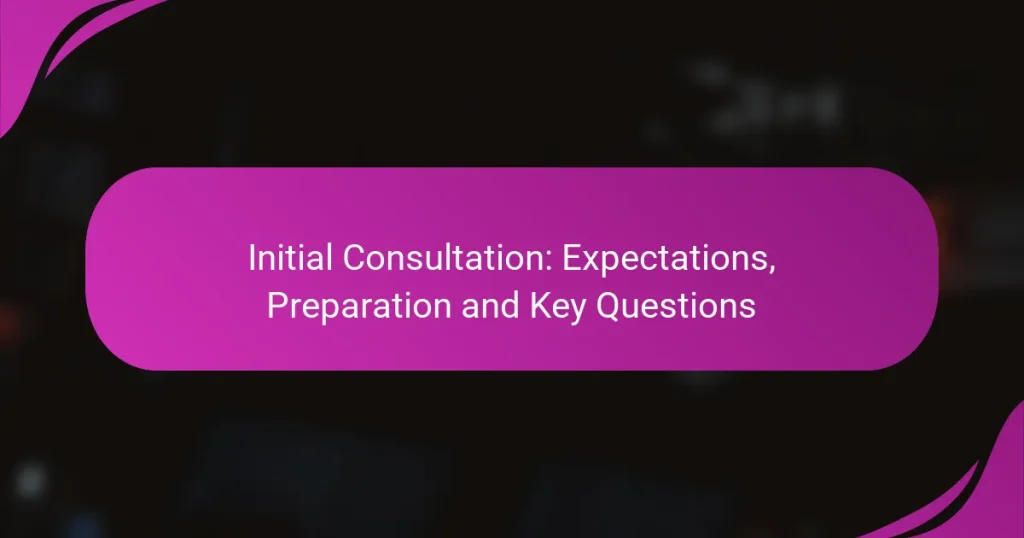An initial consultation is a crucial step in establishing a productive professional relationship, where clients can discuss their needs and goals in detail. To make the most of this meeting, it’s important to prepare by gathering relevant information and formulating key questions about services, experience, and pricing. This proactive approach ensures that the consultation is focused and tailored to your specific requirements.

What to expect during an initial consultation in Canada?
During an initial consultation in Canada, clients can expect a thorough discussion about their needs, goals, and any relevant background information. This meeting sets the foundation for the professional relationship and outlines the next steps in the process.
Overview of the consultation process
The consultation process typically begins with the professional gathering information about the client’s situation. This may include discussing specific issues, goals, and any previous experiences related to the service being sought. The professional will also explain their approach and how they can assist the client moving forward.
Clients should be prepared to share personal details that may be relevant to their case. This openness helps in crafting a tailored strategy that meets the client’s unique needs.
Typical duration and structure
An initial consultation in Canada usually lasts between 30 minutes to an hour, depending on the complexity of the client’s needs. The structure often includes an introduction, a detailed discussion of the client’s situation, and a summary of the professional’s recommendations.
It’s advisable for clients to allocate enough time to cover all necessary topics without feeling rushed. This ensures that both parties can engage in a meaningful dialogue.
Common outcomes and next steps
At the end of the consultation, clients can expect to receive a clear outline of potential next steps. This may include further assessments, additional meetings, or specific actions the client needs to take.
Common outcomes also involve setting timelines for follow-ups and discussing any fees or costs associated with the services. Understanding these aspects helps clients make informed decisions about their next steps.

How to prepare for your initial consultation?
Preparing for your initial consultation involves gathering relevant information and clarifying your objectives. This preparation helps ensure that the meeting is productive and focused on your specific needs.
Gathering necessary documents
Collecting necessary documents is a crucial step in preparation. Depending on the nature of the consultation, this may include financial statements, medical records, or legal documents. Having these materials on hand allows for a more informed discussion.
Make a checklist of the documents you need to bring. For example, if you’re meeting with a financial consultant, include tax returns, bank statements, and investment portfolios. This ensures you won’t overlook important information.
Identifying your goals and concerns
Clearly defining your goals and concerns before the consultation is essential. Consider what you hope to achieve and any specific issues you want to address. This focus will guide the conversation and help the consultant provide tailored advice.
Write down your top three priorities. For instance, if you’re consulting about a business strategy, your goals might include increasing revenue, expanding your customer base, or improving operational efficiency. This clarity will enhance the effectiveness of the meeting.
Questions to ask your consultant
Preparing questions for your consultant can lead to a more engaging and informative session. Consider asking about their experience, approach, and how they can specifically help you with your situation. This will help you gauge their suitability for your needs.
Some key questions to consider include: What is your experience with similar cases? What strategies do you recommend? How will you measure success? Having these questions ready will ensure you cover all critical aspects during your consultation.

What key questions should you ask during the consultation?
During an initial consultation, it’s essential to ask questions that clarify the services offered, the professional’s experience, and the pricing structure. These inquiries will help you gauge whether the provider is the right fit for your needs.
Questions about services offered
Start by asking about the specific services available. Inquire if they specialize in certain areas or if they provide a comprehensive range of options. For example, if you’re seeking therapy, ask whether they offer individual, group, or family sessions.
Additionally, understand the methods and approaches used in their practice. This could include asking about their treatment philosophies or any specific techniques they employ. Knowing this will help you assess if their approach aligns with your expectations.
Inquiries regarding experience and qualifications
It’s crucial to ask about the professional’s qualifications and experience. Inquire about their educational background, certifications, and any relevant licenses. This information can help you determine their level of expertise.
Also, consider asking how long they have been practicing in their field and whether they have experience with cases similar to yours. A professional with a solid track record in your specific area of concern can provide more tailored support.
Clarifications on pricing and payment options
Understanding the pricing structure is vital before committing to services. Ask about the cost of consultations and any additional fees for specific treatments or sessions. This will help you budget accordingly.
Inquire about payment options, including whether they accept insurance, offer sliding scale fees, or have payment plans. Knowing these details upfront can prevent unexpected financial burdens later on.

What are the prerequisites for a successful consultation?
To ensure a successful consultation, it’s essential to have a clear understanding of your objectives and the specific outcomes you hope to achieve. Preparation involves gathering relevant information and formulating key questions to guide the discussion.
Understanding your needs
Clearly defining your needs is the first step in a successful consultation. Consider what challenges you face and what solutions you are seeking. This clarity will help you communicate effectively with the consultant.
Take time to prioritize your needs. For example, if you are looking for financial advice, determine whether your primary concern is investment strategies, budgeting, or retirement planning. This focus will streamline the consultation process.
Researching potential consultants
Finding the right consultant involves thorough research. Start by identifying professionals with expertise relevant to your needs. Look for credentials, experience, and client reviews to gauge their suitability.
Consider reaching out to your network for recommendations. Personal referrals can lead you to trusted consultants. Additionally, check professional associations or online platforms that list qualified consultants in your area.

How does the initial consultation differ across industries in Canada?
The initial consultation varies significantly across industries in Canada, reflecting the specific needs and expectations of each sector. Understanding these differences can help clients prepare effectively and engage meaningfully with professionals in healthcare, legal services, and financial planning.
Consultations in healthcare
In healthcare, initial consultations typically focus on understanding a patient’s medical history, current symptoms, and treatment goals. Patients may expect to undergo a thorough examination and discuss potential diagnostic tests or treatment options.
Preparation for a healthcare consultation often involves bringing relevant medical records, a list of medications, and any questions about symptoms or treatments. Patients should be ready to discuss their health concerns openly to facilitate accurate assessments.
Consultations in legal services
Legal consultations usually aim to assess a client’s situation and provide advice on legal rights and options. These meetings often involve discussing the specifics of a case, including relevant documents and timelines.
Clients should prepare by gathering all pertinent information, such as contracts, correspondence, and any evidence related to their case. It’s advisable to formulate clear questions about the legal process and potential outcomes to maximize the consultation’s effectiveness.
Consultations in financial planning
In financial planning, initial consultations focus on assessing a client’s financial situation, goals, and risk tolerance. Advisors often review income, expenses, assets, and liabilities to create a tailored financial strategy.
Clients should come prepared with financial documents, such as tax returns, investment statements, and details about debts. Setting clear financial objectives and questions about investment strategies can help ensure a productive discussion.

What emerging trends are shaping initial consultations?
Initial consultations are increasingly influenced by digital technology, client-centered approaches, and a focus on personalized experiences. These trends emphasize efficiency, accessibility, and tailored communication, which enhance the overall consultation process.
Digital Tools and Platforms
The integration of digital tools and platforms is transforming initial consultations. Virtual meetings, online scheduling, and digital documentation streamline the process, allowing clients to engage from anywhere. For instance, video conferencing tools can facilitate consultations without the need for physical presence, saving time and travel costs.
Moreover, many professionals are adopting client management systems that centralize communication and documentation. This ensures that all information is easily accessible and organized, improving the efficiency of the consultation process.
Client-Centered Approaches
Client-centered approaches prioritize the needs and preferences of the client during initial consultations. This trend encourages professionals to actively listen and tailor their services based on individual client circumstances. By fostering a collaborative environment, clients feel more valued and engaged in the process.
Practitioners can implement this by asking open-ended questions and encouraging clients to share their goals and concerns. This not only builds rapport but also helps in developing customized solutions that align with the client’s expectations.
Personalization of Services
Personalization is becoming a key focus in initial consultations, with professionals striving to offer tailored experiences. This may involve customizing the consultation agenda based on the client’s specific needs or providing targeted resources that address their unique situation.
For example, a financial advisor might prepare personalized financial plans based on the client’s current financial status and future goals. This level of customization enhances client satisfaction and can lead to stronger long-term relationships.


